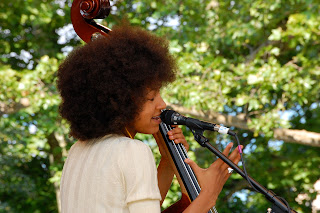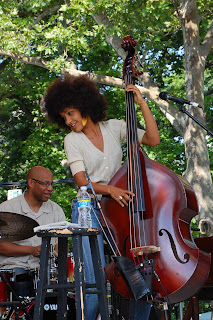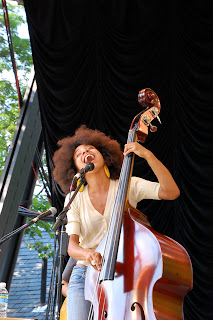
Two emerging young jazz players showcased their talents Sunday, in a hot and sunny afternoon performance at Central Park’s ongoing free Summerstage series. Opening the afternoon was 22-year-old Jonathan Batiste. From New Orleans, and enriched in its cultural soul, Batiste had a primary music education through his family’s Batiste Brothers Band, before coming of age with his 2005 debut, Times in New Orleans. Leading his own, youthful, ensemble Batiste was precocious and raw. Beginning his set on melodica, he strolled out to center stage with a trio of saxophones playing Monk’s “Round Midnight.” The melodica somehow lent the piece an increasingly romantic and nostalgic tone. But romance wasn’t on Mr. Batiste’s agenda. He ripped through some rowdier numbers including “New Orleans Blues Boy,” a song with a quick strong beat and contrapuntal lines that chased each other around like a cat and mouse, and then slowed things down for a Star Wars-themed dirge of sorts. The highlight of his set could have been a cover of, “Billie Jean”—complete with short black trousers, Jackson tour tee, and glittery scarf—but by this point the failed tunings of his youthful support where too overwhelming and distracting. A cover of “What a Wonderful World” eased the pain quite well, however, as Mr. Batiste proved himself a capable performer when cool and confidant.
At the formative age of 24, bassist and vocalist Esperanza Spalding seems destined for great things as her playing and career gain speed. In May she played Michele Obama’s “Poetry, Music and Spoken Word” event held at the White House, performing Lauryn Hill’s “Tell Him.” Ms. Hill’s commanding voice and multifarious sound are an apt comparison for Spalding’s immense talents. Sunday she quickly immersed the crowd in her eclectic mix of tropics and jazz over stirring vocals. Introducing herself and her agenda, she cooed about soul, jazz’s compelling need for it, and how what she was going to do that afternoon to help. Throughout her set she switched styles and instruments, between an augmented upright acoustic bass and electric one, such that her dynamic playing matched only the energy in her whimsically virtuosic voice. It was capable of restrained relaxed laments, or pyrotechnic scats that jumped out from inside her. Depending on the mood her voice either dripped delicately or flowed in powerful torrents. Her deft quartet matched her every step, providing a cerebral but flexible accompaniment on drums, piano and electric guitar. Spalding’s set consisted mostly of faster paced repertory like, “She Got to You.” This particularly suited her drummer, whose lightness elevated the group’s sound to match Spalding’s powerful vocals. After finishing her set the crowd was emphatic about getting her back onstage and Spalding naturally obliged, though it was clearly a genuinely earnest gesture. For her encore she got the crowd to sing the chorus on “I Adore You,” carrying it all the way to her graceful exit.








































































